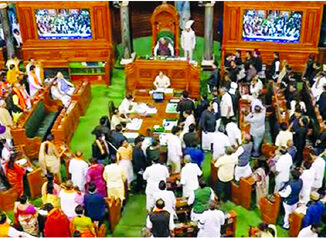
New Delhi (TIP): Amidst the numerous crises India is facing, five Bharatiya Janata Party-ruled states have decided that one of their top priorities is to pass a law based on a Hindutva conspiracy theory aimed at preventing inter-faith marriage. The leaders of Uttar Pradesh, Haryana, Madhya Pradesh, Karnataka and Assam have promised to introduced strict legal provisions to prevent “love jihad”, a conspiritorial delusion that imagines a vast, country-wide plot by Muslim men to dupe unsuspecting Hindu women into marriage with the aim of converting them to Islam.
Every aspect of these laws and the conversation around them is deeply problematic.
The idea of “love jihad” itself comes from what was once a fringe conspiracy theory among Christian and Hindu groups in Kerala that spread around the country thanks to misinformation in Hindutva networks, often picking stray incidents and weaving them into a grand narrative. The theory plays into older right-wing Hindu anxieties about the virility of Muslim men, the purported susceptibility of Hindu women and baseless fears about wholesale demographic change that will result from inter-faith marriages.
“It is impossible for Hindu groups to conceive that Hindu women can voluntarily elope or convert,” noted historian Charu Gupta, whose research unearthed similar conspiracy theories North India in the 1920s. “Thus every romance, love, elopement and marriage between a Hindu woman and a Muslim man is rewritten by Hindu organisations as forcible conversion. Hindu organisations are deeply troubled with fantasies about possible relations between Hindu women and Muslim men. Portrayal of Hindu women as victims of false love shows the need felt not so much to protect them but to discipline and control them.”
In fact, BJP leaders have made it clear that their problem is ultimately with inter-faith marriage itself, rather than any percieved criminal activity. That is a position that is both bigoted and anti-constitutional, yet becoming remarkably acceptable in the mainstream.
Besides, multiple official bodies have found no evidence of any grand plot to secretly convert Hindu women. In February, for example, the Union Minister of State for Home Affairs told the Lok Sabha that no “case of ‘love jihad’ has been reported by any of the central agencies”. Investigations by the National Investigation Agency, the Karnataka Criminal Investigation Department, the Uttar Pradesh Special Investigation Team and others have turned up no evidence for this alleged conspiracy. The National Commission for Women maintains no data about ‘love jihad”. In the most famous alleged case, involving a 24-year-old woman named Hadiya who had been born into a Hindu family, the Kerala High Court even annulled her marriage with a Muslim man, despite the woman insisting that it was a decision she had made of her own free choice. In March 2018, the Supreme Court ultimately overturned that decision. In its judgment, it raised questions about whether the courts can intervene in consensual relationships between consenting adults.





Be the first to comment